The growing global consciousness regarding environmental concerns has prompted a surge in the use of natural cosmetics in Vietnam. With an increasing number of individuals seeking safer and healthier options over conventional chemical-based beauty items, natural beauty products have gained significant traction. The availability and acceptance of natural cosmetic products in Vietnam have risen as the country strives to lead the way in sustainable living. This article aims to provide insights into the ways of using natural cosmetics in Vietnam.
Definition Of Natural Cosmetics
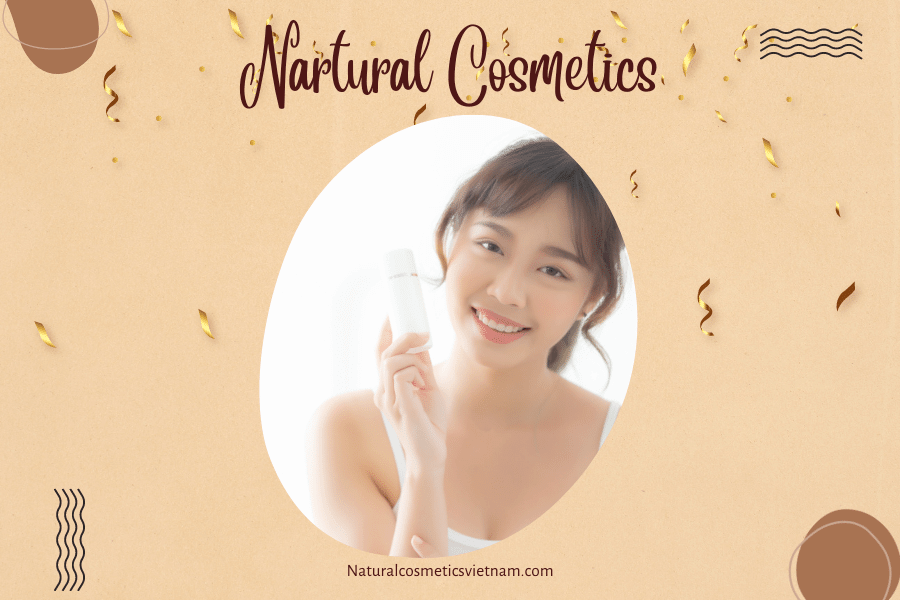
How to use natural cosmetics Vietnam
Natural cosmetics are products made from natural sources, without synthetic or artificial additives, animal by-products, or harsh chemicals. Instead, they use natural substances like oils, extracts, minerals, and waxes to create makeup, skincare, and haircare that nourish your skin without causing irritation or damage. The beauty of natural cosmetics lies in their simplicity and gentleness, providing an effective way to care for your skin without any negative side effects. Moreover, using natural ingredients is also environmentally friendly. In addition, natural cosmetics are often more affordable than synthetic ones, making them accessible to everyone. With their rising popularity in Vietnam, it’s a great time to try natural cosmetics and experience their benefits.
History of Natural Cosmetics in Vietnam
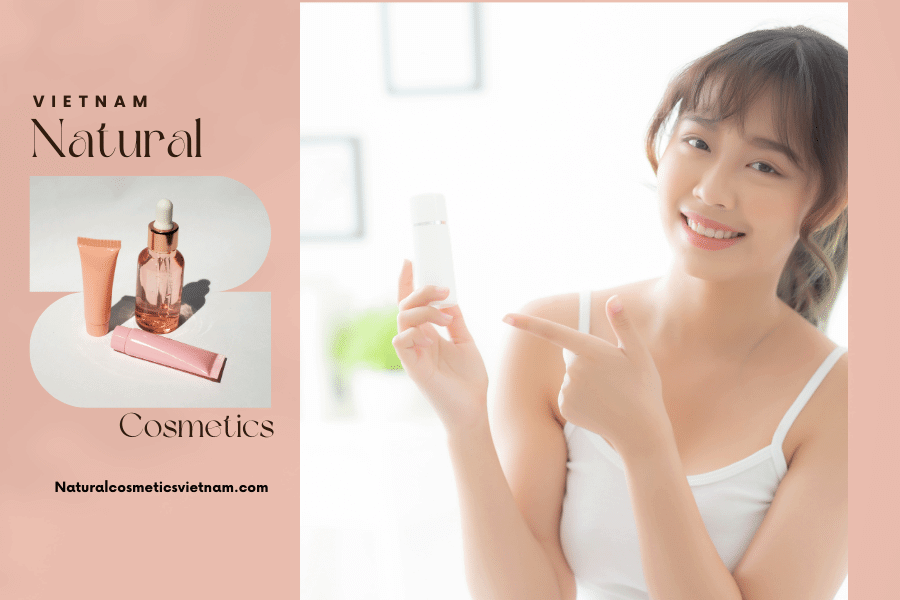
How to use natural cosmetics Vietnam
The use of natural ingredients for beauty and skincare in Vietnam can be traced back to ancient times. Traditional Vietnamese medicine and beauty practices often relied on herbs, flowers, and other natural substances to enhance beauty and promote overall wellness.
In more recent times, natural cosmetics have become increasingly popular in Vietnam due to a growing awareness of the harmful effects of synthetic ingredients on the skin and the environment. The demand for natural beauty products has led to the emergence of many local brands that specialize in using natural ingredients.
One example is the brand Hoa Hồng Cô Đơn, which was founded in 2016 and has gained a following for its handmade skincare products made with natural ingredients such as rice bran oil, honey, and green tea. Another popular brand is Saigon Suds, which produces handmade soaps using natural ingredients like turmeric, coconut oil, and aloe vera.
In addition to local brands, international natural cosmetics brands have also gained popularity in Vietnam. Brands such as Lush, The Body Shop, and Innisfree have opened stores in major cities like Hanoi and Ho Chi Minh City.
Overall, the popularity of natural cosmetics in Vietnam reflects a growing desire among consumers for products that are not only effective but also environmentally sustainable and safe for the skin.
The Evolution of Natural Cosmetics in Vietnam
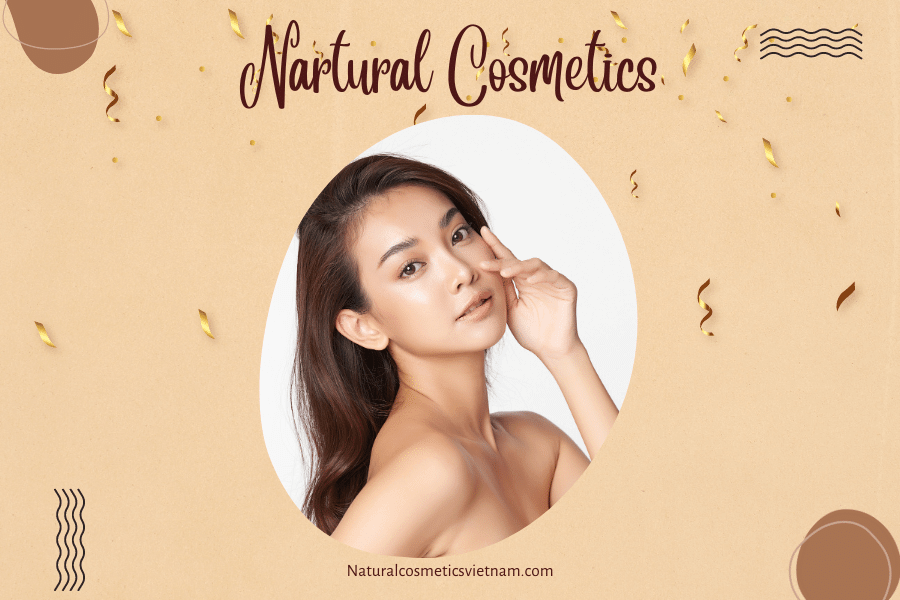
How to use natural cosmetics Vietnam
The evolution of natural cosmetics in Vietnam reflects a growing consumer demand for products that are safe, effective, and environmentally friendly. In recent years, there has been a significant shift towards using natural ingredients in cosmetics, as people become more aware of the potential risks associated with synthetic ingredients.
One of the earliest examples of natural cosmetics in Vietnam is the use of traditional herbs and remedies for beauty and skincare, which dates back centuries. For example, the use of turmeric, honey, and rice bran oil for skincare and beauty purposes is a longstanding tradition in Vietnam.
More recently, in the early 2000s, international brands such as The Body Shop and Lush began to gain popularity in Vietnam, introducing natural cosmetics to a wider audience. Vietnamese consumers began to seek out products that were free from harmful chemicals and animal testing, leading to the emergence of local natural cosmetics brands such as Saigon Suds and Lamo Cosmetics.
Today, natural cosmetics are widely available in Vietnam, both online and in physical stores. Many natural cosmetics brands use Vietnamese ingredients in their products, such as lotus flower and green tea, to appeal to local consumers.
In addition, the Vietnamese government has taken steps to support the development of natural cosmetics in the country. In 2019, the Ministry of Industry and Trade launched a project to develop natural cosmetics using local materials, with the aim of promoting sustainable economic development and reducing imports.
Overall, the evolution of natural cosmetics in Vietnam reflects a global trend towards using safer, more environmentally friendly ingredients in cosmetics, as well as a growing appreciation for traditional beauty practices and locally sourced ingredients.
Common Ingredients In Natural Cosmetics
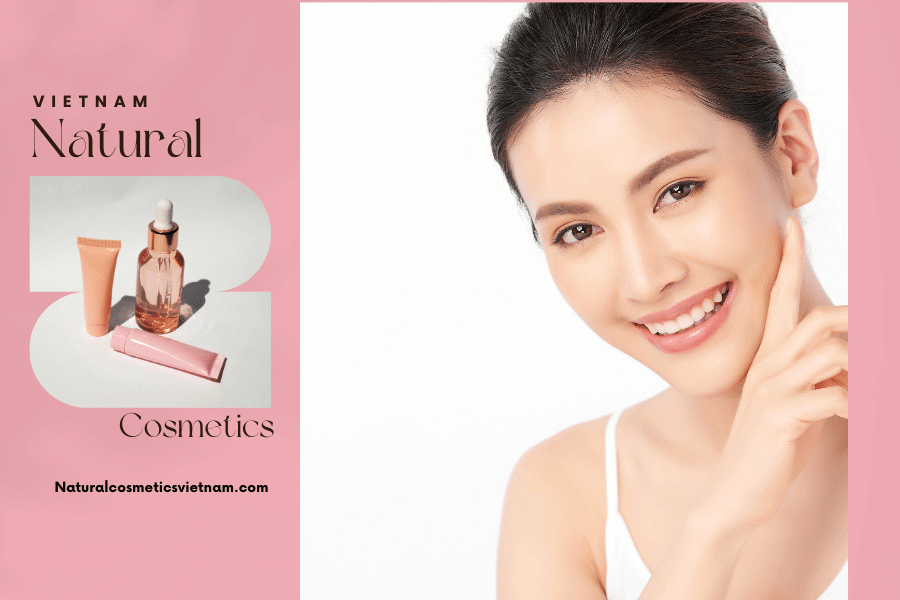
How to use natural cosmetics Vietnam
Natural cosmetics are made using ingredients that are derived from natural sources and are minimally processed. Here are some common ingredients that are often used in natural cosmetics:
- Essential oils: These are highly concentrated oils extracted from various plants, which are used for their therapeutic and aromatic properties.
- Botanical extracts: These are extracts from plants that are rich in vitamins, antioxidants, and other nutrients. Examples include chamomile, calendula, and green tea.
- Carrier oils: These are oils that are used to dilute essential oils and botanical extracts, and to moisturize and nourish the skin. Examples include jojoba oil, coconut oil, and sweet almond oil.
- Beeswax: This natural wax is often used as a thickener or emulsifier in natural cosmetics.
- Shea butter: This natural butter is derived from the shea tree and is used as a moisturizer in natural cosmetics.
- Aloe vera: This plant extract is known for its soothing and moisturizing properties and is often used in natural cosmetics for sensitive skin.
- Clay: Various types of clay, such as kaolin and bentonite, are used in natural cosmetics for their absorbent and cleansing properties.
- Natural dyes: Natural pigments, such as beetroot powder, turmeric, and cocoa powder, are often used to add color to natural cosmetics.
- Honey: This natural sweetener is also used for its antibacterial and moisturizing properties in natural cosmetics.
Benefits Of Natural Cosmetics
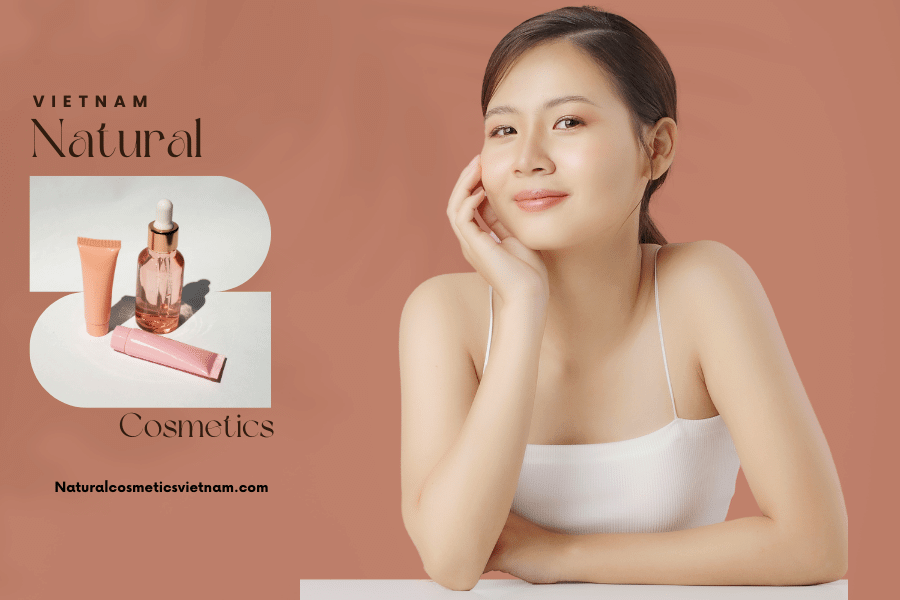
How to use natural cosmetics Vietnam
Natural cosmetics offer numerous benefits when incorporated into your beauty routine, from reducing irritation and inflammation to providing essential nutrients for healthy skin. In Vietnam, the world of natural cosmetics is a wonderful one to explore, and these products should become a regular part of your beauty regimen.
Firstly, natural cosmetics are gentle and free from harsh chemicals, fragrances, and synthetic dyes. This makes them ideal for sensitive skin, as they don’t cause irritation or inflammation. Natural ingredients like plant-based oils and extracts contain antioxidants that can help protect against environmental damage, keeping the skin looking youthful. They also often contain vitamins and minerals that nourish the skin, keeping it looking its best.
Another benefit of natural cosmetics is that they are safe and non-toxic. Unlike many conventional products that contain ingredients like parabens, sulfates, and formaldehyde, which can be harmful to the environment and our health when used long-term, natural cosmetics contain only safe and natural ingredients. This gives you peace of mind, knowing that everything you apply to your skin is completely safe.
If you’re looking for an effective way to care for your skin while being mindful of the environment, natural cosmetics are an excellent choice. They provide essential nutrients for healthy skin, reduce irritation and inflammation, and are free from harsh chemicals and synthetic dyes, making them an ideal choice for anyone who wants to look their best while protecting their health.
How to Choose the Right Natural Cosmetics
In recent years, the popularity of natural cosmetics has increased, with many individuals preferring products that are free of synthetic chemicals and harmful ingredients. However, with so many choices, it can be challenging to determine which products are genuinely natural and safe. To help you in the selection process, we will guide you through choosing the right natural cosmetics in this article.
Understanding Natural Cosmetics
Natural cosmetics are beauty products made from ingredients that are derived from natural sources, such as plants, minerals, and other naturally occurring substances. These products are formulated to be gentle on the skin and free from harmful chemicals that are commonly found in conventional cosmetics.
The ingredients used in natural cosmetics are minimally processed and are often obtained through sustainable and ethical practices. They may include essential oils, botanical extracts, carrier oils, beeswax, shea butter, aloe vera, clay, natural dyes, honey, and other natural substances.
One of the primary benefits of natural cosmetics is that they are less likely to cause skin irritation or adverse reactions than conventional cosmetics. Natural cosmetics often contain high concentrations of vitamins, minerals, and other nutrients that nourish the skin and promote healthy aging.
Furthermore, natural cosmetics are also environmentally friendly because they do not contain harsh chemicals that can harm the environment, such as synthetic fragrances, parabens, phthalates, and formaldehyde.
It’s important to note that not all natural cosmetic products are created equal, and some products may contain ingredients that are not entirely natural or safe. When choosing natural cosmetics, it’s essential to read the labels carefully and research the brand’s production process to ensure that the products are genuinely natural and free from harmful chemicals.
Look for High-Quality Natural Ingredients
When choosing natural cosmetics, it’s essential to look for high-quality natural ingredients. Here are some tips to help you identify natural cosmetics with the best ingredients:
- Check the label: Look for products with labels that clearly list the ingredients used. Avoid products with vague or confusing ingredient lists.
- Avoid synthetic chemicals: Stay away from products that contain synthetic fragrances, parabens, phthalates, and other harsh chemicals. These can be harmful to your skin and the environment.
- Look for organic ingredients: Products with organic ingredients are often a safer option as they have been grown without the use of pesticides and other harmful chemicals.
- Choose minimally processed ingredients: Ingredients that are minimally processed retain more of their natural nutrients and are less likely to cause skin irritation or other adverse reactions.
- Research the brand: Look for brands that are transparent about their production process and sourcing of ingredients. This information should be available on their website or packaging.
- Consider the type of natural ingredient: Some natural ingredients are better suited for certain skin types or concerns. For example, lavender oil is great for calming and soothing the skin, while tea tree oil is excellent for fighting acne.
By paying attention to the quality of the natural ingredients in your cosmetic products, you can ensure that you are choosing products that are safer for your skin and the environment.
Avoid Harmful Chemicals
When choosing cosmetics, it’s important to avoid harmful chemicals that can be damaging to your skin and health. Here are some of the most common harmful chemicals found in cosmetics that you should avoid:
- Parabens: These are synthetic preservatives that can mimic estrogen in the body and have been linked to breast cancer and reproductive issues.
- Phthalates: These are chemicals used to make plastics more flexible and are often found in fragrances. They have been linked to hormone disruption, birth defects, and reproductive issues.
- Formaldehyde: This is a preservative that is often used in hair products and nail polish. It is a known carcinogen and can cause skin irritation and allergic reactions.
- Sodium Lauryl Sulfate (SLS) and Sodium Laureth Sulfate (SLES): These are harsh detergents often used in shampoos, body washes, and facial cleansers. They can be irritating to the skin, eyes, and respiratory system.
- Synthetic fragrances: These are often used to mask unpleasant odors in cosmetics and can contain hundreds of harmful chemicals. They can cause skin irritation, allergic reactions, and hormone disruption.
- Coal tar dyes: These are often used in hair dyes and have been linked to cancer and other health issues.
By avoiding these harmful chemicals and opting for natural cosmetics instead, you can protect your skin and health. Look for products that are free from these harmful chemicals and instead contain natural, organic ingredients that are gentle and safe for your skin.
Look for Certified Organic or Eco-Friendly Products
When choosing natural cosmetics, it’s important to look for certified organic or eco-friendly products. These products have been certified by independent organizations and meet strict standards for quality and sustainability. Here are some certifications to look for:
- USDA Organic: This certification is given to products made with at least 95% organic ingredients. Look for products with the USDA Organic seal on the label.
- Ecocert: This certification is given to products that meet strict standards for environmental and social responsibility. Look for products with the Ecocert seal on the label.
- COSMOS: This certification is given to products that meet strict standards for organic and natural ingredients, sustainable manufacturing practices, and packaging. Look for products with the COSMOS seal on the label.
- Leaping Bunny: This certification is given to products that have not been tested on animals. Look for products with the Leaping Bunny seal on the label.
- Fair Trade Certified: This certification is given to products that meet strict standards for fair labor practices and sustainable sourcing of ingredients. Look for products with the Fair Trade Certified seal on the label.
By choosing certified organic or eco-friendly products, you can be sure that you are choosing products that are safe, sustainable, and socially responsible. Look for these certifications on the label and do your research to find brands that are committed to using natural and sustainable ingredients.
Read the Labels
To choose natural cosmetics wisely, it is crucial to read the labels carefully. Look for products that provide clear and specific information about their ingredients, and avoid those that use vague terms like “fragrance” or “parfum,” which can conceal a range of synthetic chemicals.
Consider Your Skin Type
When selecting natural cosmetics, it’s crucial to take your skin type into account since various natural ingredients are better suited for specific skin types. For instance, lavender essential oil is highly effective for oily skin, while chamomile essential oil is more beneficial for dry and sensitive skin.
Check for Allergens
Even though natural ingredients are generally safer, they can still cause allergic reactions. Therefore, it’s important to check for allergens before using a natural cosmetic product. Look for products that provide clear and specific information about allergens, and avoid those that contain ingredients to which you are allergic.
Look for Reviews
To determine the effectiveness of a natural cosmetic product, reviews can be helpful. Seek out reviews from individuals with similar skin types and concerns as yours to get an idea of how well the product performs.
Consider the Packaging
When choosing natural cosmetics, the packaging is also an essential consideration. Look for products that are packaged in eco-friendly materials, such as glass jars or biodegradable containers. It’s also crucial to avoid products that come in excessive packaging, as this can lead to unnecessary waste.
Consider the Price
Price is an important factor to consider when selecting natural cosmetics as they can be more expensive than conventional cosmetics. Therefore, it’s crucial to look for products that are within your budget while still maintaining high-quality ingredients.
Try Samples
To avoid investing in a product that may not work for you, it’s a good idea to try samples of natural cosmetics before making a purchase. Look for companies that offer samples or consider purchasing travel-sized versions of the product to test it out.
Consider the Brand’s Ethics
When selecting natural cosmetics, it’s important to consider the ethics of the brand. Choose brands that are transparent about their ingredients and manufacturing processes and are committed to sustainability, cruelty-free, and ethical practices.
Look for Multifunctional Products
Examples of multi-purpose natural cosmetics include a product that can function as both a moisturizer and sunscreen, or a tinted lip balm that can double as a blush.
Consider Your Values
Selecting the appropriate natural cosmetics is not just about finding products that are safe and suitable for your skin, but it also involves aligning with your values. Look for cosmetics that align with your principles, such as vegan and cruelty-free products.
While selecting natural cosmetics can be challenging, you can simplify the process by considering factors such as high-quality natural ingredients, avoiding harmful chemicals, reading labels carefully, and trying samples. Additionally, remember to consider your skin type, budget, and the ethics of the brand to make the right choice.

How to use natural cosmetics Vietnam
How To Properly Use Natural Cosmetics
Using natural cosmetics correctly can help you achieve the best results and get the most out of your products. Here are some tips for using natural cosmetics:
- Cleanse your skin: Before applying any cosmetic product, make sure your skin is clean and free from dirt and oil.
- Moisturize: Apply a natural moisturizer to your face and neck to hydrate your skin and create a smooth base for your makeup.
- Apply sparingly: Natural cosmetics are often more concentrated than conventional products, so it’s essential to use them sparingly. Start with a small amount and build up gradually as needed.
- Use the right tools: Use clean brushes, sponges, or your fingers to apply natural cosmetics. Ensure that your tools are free from dirt and bacteria to avoid skin irritation.
- Layer products: If you are using multiple natural cosmetics, apply them in thin layers, allowing each layer to dry completely before applying the next one.
- Follow instructions: Always follow the instructions on the product packaging for the best results.
- Store properly: Store your natural cosmetics in a cool, dry place away from direct sunlight to preserve their effectiveness and shelf life.
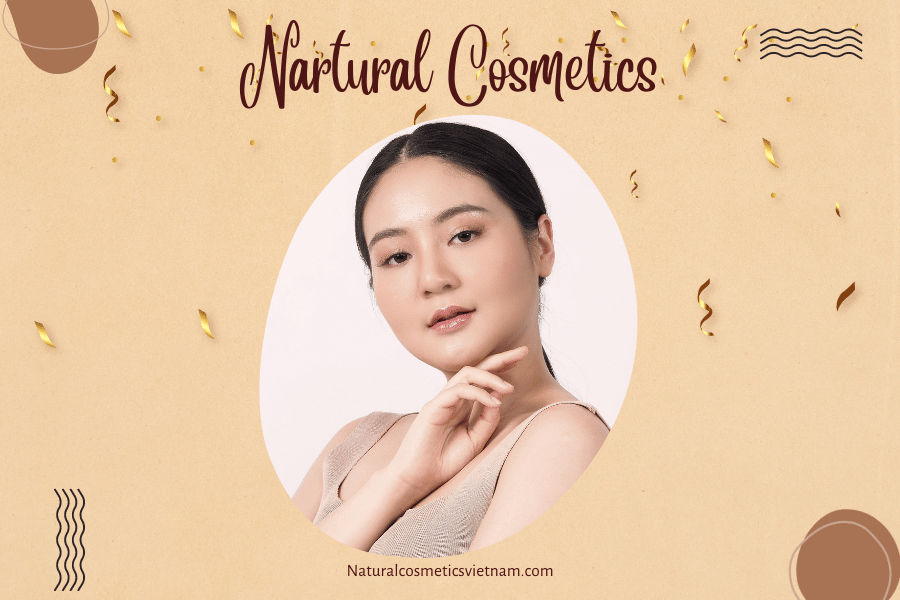
How to use natural cosmetics Vietnam
Tips for Using Natural Cosmetics
Here are some additional tips for using natural cosmetics effectively:
-
- Patch test: Before using a new natural cosmetic product, perform a patch test on a small area of your skin to check for any allergic reactions.
- Be patient: Natural cosmetics often take longer to show results than conventional products. Be patient and consistent in your use to see the best outcomes.
- Customize your routine: Experiment with different natural cosmetics and find the ones that work best for your skin type and concerns.
- Consider your lifestyle: If you live in a humid climate, for example, you may want to choose lightweight natural cosmetics that won’t clog your pores.
- Remove makeup before bed: Make sure to remove all traces of makeup before going to bed to avoid clogging your pores and causing breakouts.
- Use as directed: Follow the product’s instructions for the best results and avoid using too much of the product.
- Stay hydrated: Drink plenty of water and stay hydrated to keep your skin looking healthy and radiant.
Vietnam has emerged as a hub for organic and eco-friendly beauty products, making it an ideal destination for those looking to explore natural cosmetics. By following our tips and selecting the appropriate products, you can take advantage of the benefits of natural cosmetics while simultaneously taking care of your skin and the environment, thus enhancing your natural beauty.












Leave a reply